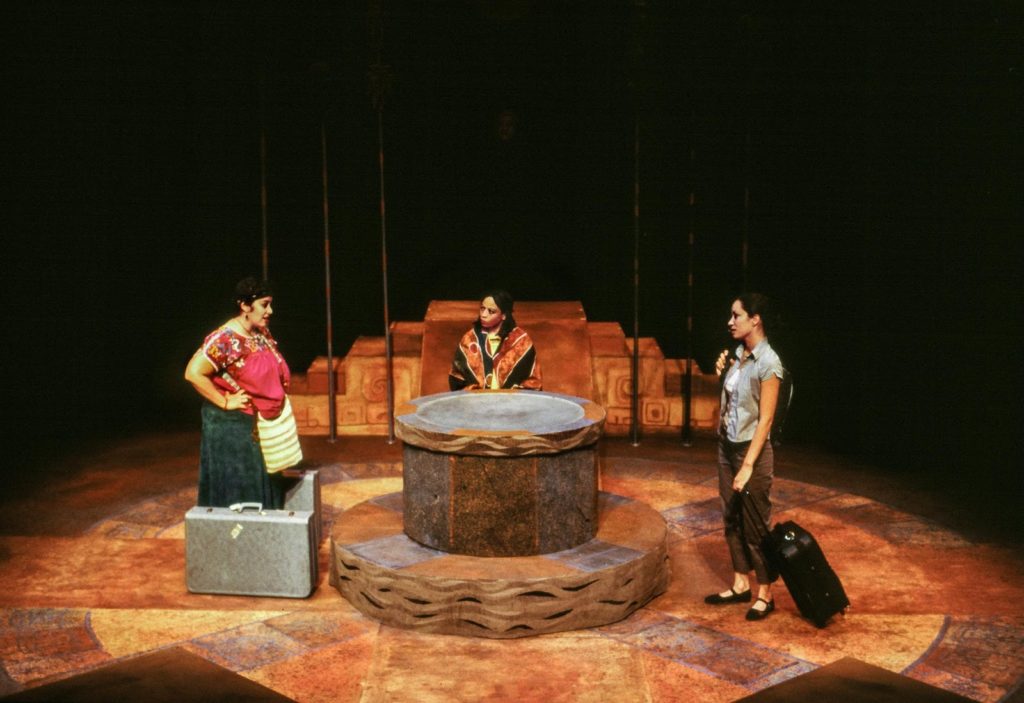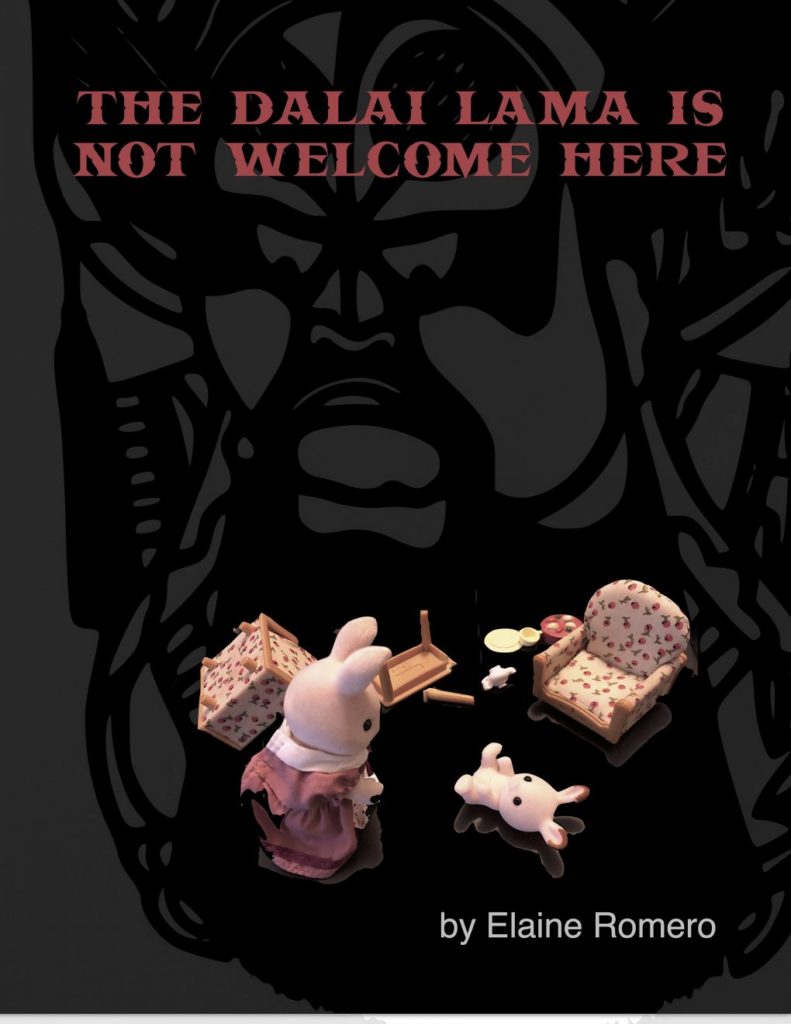
Biography
Elaine Romero is a Latina award-winning playwright. Author of over 60 plays, her key works include Barrio Hollywood, Secret Things, ¡Curanderas! Serpents of the Clouds, Graveyard of Empires, and A Work of Art. Her work has been developed and produced across the U.S. and internationally, most notable at the Magic Theatre, Arizona Theatre Company, Kitchen Dog Theater, Borderlands Theater, and INTAR. Romero’s work has been recognized by awards and honors such as the Arizona Commission on the Arts Playwriting Fellowship, TCG/Pew National Theatre Artist in Residence grant, Los Angeles Film School Scholarship, Los Angeles Film School Scholarship, Sprenger-Lang New History Play Contest, Tennessee Williams One-Act Play Award, and the Chicano/Latino Literary Award. Romero received her BA in Theater from Linfield College and her MFA in Playwriting from University of California, Davis. She also studied playwriting with María Irene Fornés. Raised in California and Oregon and now based in Tucson, Arizona, Romero currently serves as an Associate Professor at the University of Arizona and Playwright-in-Residence at the Arizona Theatre Company.
Career Highlight
For the month of March 2021, Elaine Romero’s work was digitally showcased and celebrated across the U.S. and Mexico, as part of RomeroFest. RomeroFest was made possible through the collaboration between Arizona Theatre Company, The Scoundrel and Scamp Theatre, and the Winding Road Theater Ensemble. The University of Notre Dame contributed to Romero Fest with a virtual staged reading of ¡Curanderas! Serpents of the Clouds.
¡Curanderas! Serpents of the Clouds
- Genre: Drama
- Breakdown:
- 3W Latinx, 1M Latinx
- Synopsis:
- ¡Curanderas! Serpents of the Clouds is a two-act play that follows two women – Paloma, a curandera (folk healer) in her 40s, and Victoria, a recently graduated doctor in her 20s – as they attempt to escape the problems and pain in their personal lives by traveling from San Antonio, Texas to Mexico City, Mexico. Tensions immediately arise between these two protagonists as Paloma believes that illness goes beyond the physical body and into the spirit, but Victoria refuses to believe anything beyond what her Western medical education has taught her. As they continue to spend more time together in the interwoven natural and supernatural worlds, including visits from a mystical Aztec woman, they each are forced to deal with the problems they are running away from and undergo changes that impact each of their healing abilities.
- Development/Production History:
- Developed and workshopped at the Guadalupe Cultural Arts Center (San Antonio, TX) in 1995
- Directed by José Manuel Galvan
- World Premiere at Invisible Theatre (Tucson, AZ) in 2000
- Directed by Deborah Dickey
- Produced by Susan Claassen
- Produced at Kitchen Dog Theatre (Dallas, TX) in 2003
- Directed by Christopher Carlos
- Produced at Phoenix Theatre (Indianapolis, IN) in 2004
- Directed by Bryan Fonseca
- Produced at Santa Fe Playhouse (Santa Fe, NM) in 2006
- Directed by Valli Marie Rivera
- Staged Readings at Teatro Bravo (2009, as part of the New Play Series), Teatro Luna, and Stages Repertory Theatre
- Virtual Reading by the University of Notre Dame as part of RomeroFest on March 25, 2021
- Directed by Tashi Thomas
- Developed and workshopped at the Guadalupe Cultural Arts Center (San Antonio, TX) in 1995
- Weblink to purchase play from publisher:
- Photos from Production:

Photo: ©️ Linda Blase
The Dalai Lama Is Not Welcome Here
- Genre: Drama
- Breakdown:
- 3W (1W Chinese), 3M (2M Chinese)
- Synopsis:
- The Dalai Lama is Not Welcome Here is a two-act play that follows protagonist Kate Miller, a 28-year-old journalist, as she mourns the death of her only son Ben, who died as a result of a screw coming loose in a toy produced by a Chinese toy company called Give Joy Toys. Kate’s grief and anger are further intensified as her husband Peter is offered and accepts a job in China. As she comes to meet Mr. Hsu, the owner of Give Joy Toys, and his daughter Ping-Ping, Kate must explore if revenge is actually “sweet” and whether she is willing to accept the consequences.
- Development/Production History:
- Commissioned by InterAct Theatre Company (Philadelphia, PA) in 2008 through the 20/20 New Play Commission Program
- Workshopped at Playwrights’ Center (Minneapolis, MN) in 2008
- Directed by Michael Bigelow Dixon
- Developed and read at Lark New Play Development Center’s Winters Writers Retreat (New York, NY)
- Workshopped twice at InterAct
- March 27, 2021 – World premiere as part of RomeroFest
- Directed by Maren Maclean Mascarelli
- Weblink to purchase play from publisher:
- Photos from Production:

- Plays
- Forced Entry (1993)
- If Susan Smith Could Talk (1995)
- The Fat-Free Chicana and the Snow Cap Queen (1996)
- Walking Home (1996)
- Glow in the Dark Woman (1999)
- Undercurrents (1999)
- Before Death Comes for the Archbishop (2000)
- ¡Curanderas! Serpents of the Clouds (2000)
- Day of Our Dead (2001)
- Catalina de Erauso: The Man Inside of Me (2002)
- The Prodigal Grandpa (2002)
- Barrio Hollywood (2003)
- Alicia (2006)
- Ponzi (2011)
- Secret Things (2013)
- Mother of Exiles (2013)
- Graveyard of Empires (2015)
- A Work of Art (2015)
- Swastika (2016)
- Modern Slave (2016)
- Title IX (2016)
- The Dalai Lama Is Not Welcome Here (2021)
- Bibliography
- Boffone, Trevor. “Elaine Romero.” 50 Playwrights Project, 24 Apr. 2017, 50playwrights.org/2017/04/24/elaine-romero/.
- Desk, Press Release. “Arizona Theatre Company Plans RomeroFest To Highlight Local Plays.” Phoenix, AZ Patch, Patch, 1 Feb. 2021, patch.com/arizona/phoenix/arizona-theatre-company-plans-romerofest-highlight-local-plays.
- García-Romero, Anne. The Fornes Frame: Contemporary Latina Playwrights and the Legacy of Maria Irene Fornes. Tucson : The University of Arizona Press 2016.
- Hernandez, Ernio. “Romero’s Premiere of Curanderas! Ends at Tucson’s Invisible, Dec. 17.” Playbill, 16 Dec. 2000, www.playbill.com/article/romeros-premiere-of-curanderas-ends-at-tucsons-invisible-dec-17-com-93868.
- Paine, Herbert. BWW Review: The Dalai Lama Is Not Welcome Here ~ ELAINE Romero’s New Work-in-Progress. 27 Mar. 2021, www.broadwayworld.com/phoenix/article/BWW-Review-THE-DALAI-LAMA-IS-NOT-WELCOME-HERE-ELAINE-ROMEROS-New-Work-In-Progress-20210327.
- Romero, Elaine and Anne García-Romero. “Expanding the Chair: A Conversation on Fornés’s Pedagogy in Action.” Theatre Topics, vol. 27 no. 1, 2017, p. 83-90. Project MUSE, doi:10.1353/tt.2017.0000.
- Szymkowicz, Adam. I Interview Playwrights Part 280: Elaine Romero, 10 Nov. 2010, aszym.blogspot.com/2010/11/i-interview-playwrights-part-280-elaine.html.
- Web Resources
Reflection on Contribution to Anti-Racist Theatre
Elaine Romero contributes to Anti-Racist Theater by creating plays that deeply explore the diversity in an individual culture. In doing so, she conveys to audiences that the Latinx experience is far from being monolithic. Furthermore, she is a playwright that does not let her identification as a “Latina” limit her to only telling Latinx stories. She is not afraid to look beyond her culture and delve into others respectfully and with evident preparation and research. Finally, her plays present audiences with characters that are not stereotypical but rather complex and imperfect. Through this imperfection, Elaine Romero introduces diverse, unique, and most important of all, real and human characters into American theatre that allow audiences to listen, understand, and relate to diverse characters with complex cultural backgrounds.
Compiled by Stacy Manrique, Computer Science and Film, Television, and Theatre, 2022.